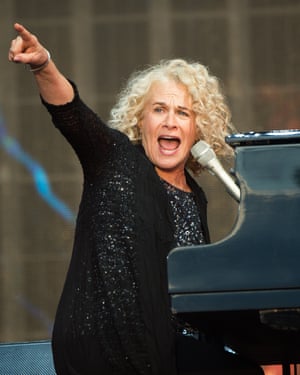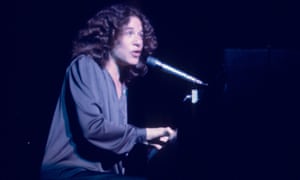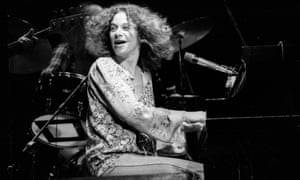Extract from The Guardian
The songwriter has been drawn out of semi-retirement, rewriting her
song One to try to persuade voters to ‘take us away from the terrible
direction America is going in’
At
her home in rural Idaho, Carole King is having some difficulty saying
the president’s name. “Trump,” she manages eventually, her accent still
pure Brooklyn half a century after she left New York and became the
biggest-selling female solo artist of the early 70s. “I don’t even like
using his name,” she says. “Let’s not use his name. Let’s just say ‘the
leader of my country’ instead.”
King keeps a low media profile that speaks more of a self-effacing personality than suspicion or reclusiveness. As reviews of her 2012 autobiography, A Natural Woman, pointed out, she has a tendency to play down her vast success, barely mentioning in the book that her 1971 album Tapestry sold 25m copies, and summarising the astonishing run of 1960s hits she wrote with her then-husband, the late Gerry Goffin – The Loco-Motion, Will You Still Love Me Tomorrow?, Up on the Roof, (You Make Me Feel Like) A Natural Woman – with the line: “We continued to write enough songs to pay our mortgage.”
King keeps a low media profile that speaks more of a self-effacing personality than suspicion or reclusiveness. As reviews of her 2012 autobiography, A Natural Woman, pointed out, she has a tendency to play down her vast success, barely mentioning in the book that her 1971 album Tapestry sold 25m copies, and summarising the astonishing run of 1960s hits she wrote with her then-husband, the late Gerry Goffin – The Loco-Motion, Will You Still Love Me Tomorrow?, Up on the Roof, (You Make Me Feel Like) A Natural Woman – with the line: “We continued to write enough songs to pay our mortgage.”
With a songwriter’s precise command of language, King doesn’t like my suggestion that she has made it more strident. “It is definitely a call to action,” she demurs. “Strident can suggest someone really pushing forward with an idea, and I’m not really pushing forward with the idea – I’m releasing it to the people, for the people to hear.”

But she doesn’t discount the idea of writing songs again, as long as she has the motivation. Certainly, when the idea of rewriting One presented itself – initially to perform as the opening act at “a women’s power luncheon” for nine female candidates for the US House of Representatives – she was drawn to the piano “like pins to a magnet”.
“I don’t choose to turn [songwriting] off,” she says. “It just wasn’t coming. I felt like I had nothing new to say.” With this event, she realised she did. “I basically already said it in the song once, but some of it wasn’t relevant to the situation today. I wanted to add power to the ending.” She corrects herself: “Empowerment, not power. Empowerment is what I’m about right now.”
She decided to record it in mid-October, at the same studio in which she recorded Tapestry (the A&M Recording Studio B, now renamed Henson, after the company behind the Muppets bought it in 2000). “I just felt that you hear so many times people saying: ‘Why should I bother to vote – my vote doesn’t make a difference, why should I bother to do this or that?’ It bears on the election because it’s about people who value acting in a spirit of love and compassion and caring for our neighbours – our immediate neighbours and our neighbours around the world – coming together to find what we have in common rather than the division that is going on.”
She returns to Trump. “The leader of our country is using rhetoric that is encouraging people to bring out their fear and hatred and violence, and I really feel we must do something to stop that, and I believe the Democratic party in our country is our hope for this now, because the Republican party is pretty much rubber-stamping – or if they’re not rubber-stamping, they’re saying nothing, which makes them, in my view, complicit in stirring up the worst emotions, in promoting lies: outright, provable lies. I think the Democratic party is our hope to take us away from the terrible direction that America is going in. That does not make me unpatriotic or disloyal. I’m the honest opposition and I support the honest opposition to what the government in my country is standing for today.”

She says being back in the same studio and seated at the same piano that Tapestry was recorded on was “magical”. She has often talked about how immature she was when she made that album, which seems strange, partly because she was a divorced 29-year-old mother of two, and partly because Tapestry’s blockbusting success was partly due to it being among the first major rock albums to speak to a female audience in a mature voice.
But there is also a sense in which it fixed King in people’s minds as the figure on the album’s cover: a mild-mannered, folksy writer whose concerns lay more with the personal than the political. It’s a perception she seems keen to dispel. “I got involved through advocating for the environment and half my life became political, really. People know, but they don’t know how much time I’ve spent on Capitol Hill, working with politicians and that whole world. It’s what my novel’s about. And now, to have this song come out, it is part of who I am.”

No comments:
Post a Comment